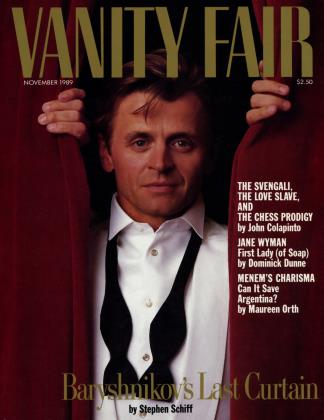Sign In to Your Account
Subscribers have complete access to the archive.
Sign In Not a Subscriber?Join NowCampion Class
The best movie at this year's Cannes Film Festival (and, for that matter, at the recent New York Film Festival) was roundly booed every time it played—and no wonder. Sweetie, the first feature by the thirty-five-year-old New Zealand director Jane Campion, is a stark tragicomedy that tickles you one minute and slaps the grin off your face the next; in its way, it's as disturbing as Blue Velvet. Campion's film had been eagerly awaited (her shorts have won awards from Amsterdam to Sydney), but for some of her fans, Sweetie may have seemed too tough, too abrasive. The setting is a blasted Aussie suburbia, and the subject is love—not the swoony ecstasy of romantic fiction, but love as a burden, as a chimera, as a spooky, supernatural current. For the movie's wan heroine, Kay (Karen Colston), romance has always seemed sort of sinister. She has a chronic case of the heebie-jeebies, and one begins to understand why when her older sister, Sweetie (Genevieve Lemon), decides to move in with her, hauling her junkie boyfriend in tow. Fat, noisy, and dangerously mercurial, Sweetie is like a bloated demiurge—she's Appetite personified—and at first the movie seems to be turning into a creepy Pinteresque power stuggle. But Campion's vision is broader than that. Sweetie proves not just annoying but clinically schizophrenic, and Campion's movie becomes a lacerating examination of the way family ties chafe and squeeze, of the pain of having to love someone incapable of inspiring love. Campion, who studied painting, sculpture, and anthropology before attending the Australian Film and Television School, gives her movie an oddly skewed style reminiscent of such American photographers as Garry Winogrand and Diane Arbus: she turns banality into a freak show, and freakishness into the stuff of everyday life. But she also has a kind of astringent compassion. Working with novice actors and a crew of old friends, she and co-writer Gerard Lee have created a sublimely unsettling work—and the most original film of the year. —STEPHEN SCHIFF
STEPHEN SCHIFF
 View Full Issue
View Full Issue












Subscribers have complete access to the archive.
Sign In Not a Subscriber?Join Now